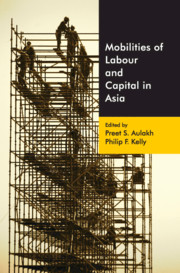Book contents
- Frontmatter
- Contents
- List of Figures
- List of Tables
- List of Appendices
- Acknowledgements
- 1 Introduction: Conceptualizing Labour and Capital Mobilities In and Out of Asia
- SECTION I From Capital to Labour Mobility
- 2 Offshore Spaces: Multi-scalar Bordering Processes and the Segmented Mobilities of Capital and Labour in Asia
- 3 Japanese Multinational Companies and the Control of Overseas Investments: Expatriates, Foreign Employees, and Japan's Soft Power
- 4 Accumulation at the Margins? Mineral Brokerage and Chinese Investments in Philippine Mining
- 5 Soft Power and Transnationalism Affecting Capital and Labour Mobility: Chinese Diaspora in Mexico and Peru
- 6 The Spatial Decoupling and Recombination of Capital and Labour: Understanding the New Flows across the China–South East Asia Borderlands
- SECTION II From Labour to Capital Mobility
- Notes on Contributors
- Index
5 - Soft Power and Transnationalism Affecting Capital and Labour Mobility: Chinese Diaspora in Mexico and Peru
from SECTION I - From Capital to Labour Mobility
Published online by Cambridge University Press: 24 December 2019
- Frontmatter
- Contents
- List of Figures
- List of Tables
- List of Appendices
- Acknowledgements
- 1 Introduction: Conceptualizing Labour and Capital Mobilities In and Out of Asia
- SECTION I From Capital to Labour Mobility
- 2 Offshore Spaces: Multi-scalar Bordering Processes and the Segmented Mobilities of Capital and Labour in Asia
- 3 Japanese Multinational Companies and the Control of Overseas Investments: Expatriates, Foreign Employees, and Japan's Soft Power
- 4 Accumulation at the Margins? Mineral Brokerage and Chinese Investments in Philippine Mining
- 5 Soft Power and Transnationalism Affecting Capital and Labour Mobility: Chinese Diaspora in Mexico and Peru
- 6 The Spatial Decoupling and Recombination of Capital and Labour: Understanding the New Flows across the China–South East Asia Borderlands
- SECTION II From Labour to Capital Mobility
- Notes on Contributors
- Index
Summary
Introduction
The rise of China in the international arena is an indisputable fact (Shambaugh, 2013). The dynamics that made its advance and the whole economic reform process possible are well known to scholars, although the role played by 50 million overseas Chinese is the subject of limited discussion. They are probably the most extensive expatriate community in the world, with the potential to become an extended army for the hegemonic plans of the People's Republic of China (PRC), using soft power. Most times, researchers present a narrow view of the Chinese diaspora (or the spread and settlement of the overseas Chinese all over the globe); consequently, the contribution of the diaspora to the achievements of the PRC is still unclear. In our view, a primary goal of China is to gain leadership in global affairs through peaceful means (Mingjiang, 2008). Despite its military power and economic might, China is resorting to the promotion of its culture, leadership in multilateral organizations, and the use of the network formed by its citizens or descendants scattered around the world.
In this chapter, we explore the bonds between Chinese foreign direct investment (FDI) and migration into Latin America as dual means to exercise and extend soft power. We analyse the linkages between the overseas Chinese and the motherland, within the context of the soft power theory of Joseph Nye. Thus, we bring a new perspective into how capital and labour may be interconnected across the Chinese communities while contributing to the strategic interest of the motherland. We selected this particular region because China ‘is getting closer to Latin America due to geopolitical reasons, market expansion, as well as for the need to secure agricultural commodities and raw materials for its industry’ (Valderrey and Montoya, 2016: 6). We focus on two Latin American countries that are as remote from one another as appears possible: Mexico and Peru. Thus, we can assess the importance of integration and transnationalism of overseas communities in the two nations as well as to what extent Chinese migratory flows have a relationship with Chinese state-owned enterprises (SOEs) and their investment choices in such contexts. We also evaluate whether or not soft power from the PRC and transnationalism affect capital and labour mobility in Chinese firms seeking business opportunities in the area.
- Type
- Chapter
- Information
- Mobilities of Labour and Capital in Asia , pp. 98 - 119Publisher: Cambridge University PressPrint publication year: 2020
- 1
- Cited by



